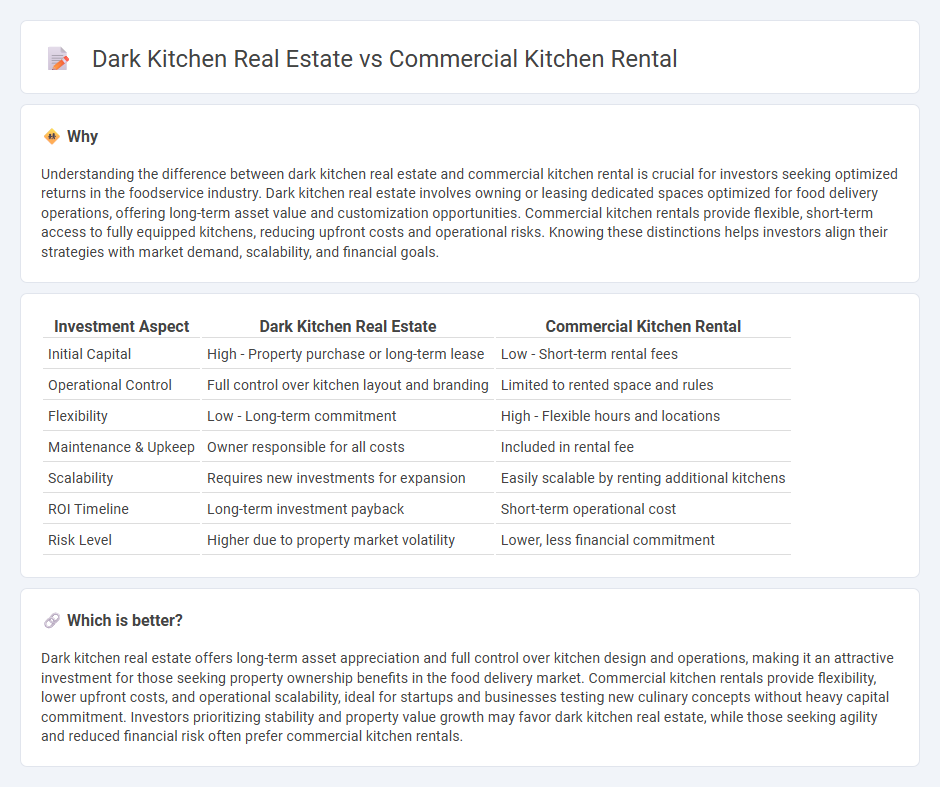
Dark kitchen real estate offers investors a chance to capitalize on the booming food delivery market by owning dedicated spaces optimized for ghost kitchens, often located in strategic urban areas. Commercial kitchen rentals provide flexible, short-term solutions for startups and caterers, reducing upfront costs but lacking long-term asset appreciation. Explore the advantages and challenges of each approach to make an informed investment decision.
Why it is important
Understanding the difference between dark kitchen real estate and commercial kitchen rental is crucial for investors seeking optimized returns in the foodservice industry. Dark kitchen real estate involves owning or leasing dedicated spaces optimized for food delivery operations, offering long-term asset value and customization opportunities. Commercial kitchen rentals provide flexible, short-term access to fully equipped kitchens, reducing upfront costs and operational risks. Knowing these distinctions helps investors align their strategies with market demand, scalability, and financial goals.
Comparison Table
| Investment Aspect | Dark Kitchen Real Estate | Commercial Kitchen Rental |
|---|---|---|
| Initial Capital | High - Property purchase or long-term lease | Low - Short-term rental fees |
| Operational Control | Full control over kitchen layout and branding | Limited to rented space and rules |
| Flexibility | Low - Long-term commitment | High - Flexible hours and locations |
| Maintenance & Upkeep | Owner responsible for all costs | Included in rental fee |
| Scalability | Requires new investments for expansion | Easily scalable by renting additional kitchens |
| ROI Timeline | Long-term investment payback | Short-term operational cost |
| Risk Level | Higher due to property market volatility | Lower, less financial commitment |
Which is better?
Dark kitchen real estate offers long-term asset appreciation and full control over kitchen design and operations, making it an attractive investment for those seeking property ownership benefits in the food delivery market. Commercial kitchen rentals provide flexibility, lower upfront costs, and operational scalability, ideal for startups and businesses testing new culinary concepts without heavy capital commitment. Investors prioritizing stability and property value growth may favor dark kitchen real estate, while those seeking agility and reduced financial risk often prefer commercial kitchen rentals.
Connection
Dark kitchen real estate investment capitalizes on the growing demand for food delivery services by providing strategically located commercial kitchen spaces designed for efficient meal preparation and order fulfillment. Commercial kitchen rentals offer scalable, fully equipped environments that minimize startup costs and operational risks for food entrepreneurs, making them attractive assets within the dark kitchen model. The synergy between dark kitchen concepts and commercial kitchen real estate creates lucrative opportunities in urban areas with high delivery demand and limited traditional restaurant spaces.
Key Terms
Lease Agreement
Commercial kitchen rental lease agreements typically involve short-term contracts with flexible terms tailored for catering businesses, food trucks, or pop-up events, emphasizing equipment use and maintenance responsibilities. Dark kitchen real estate leases usually require longer commitments with clauses focused on exclusive use, high-tech infrastructure, and delivery logistics optimization to support online food delivery platforms. Explore detailed lease agreement comparisons to make informed decisions between these two commercial kitchen options.
Zoning Regulations
Commercial kitchen rentals typically comply with local zoning regulations designed for food preparation and retail services, ensuring safety and accessibility for businesses. Dark kitchens, often located in less traditional areas, must navigate specific zoning laws that permit delivery-only food operations without customer-facing spaces. Discover how zoning requirements impact your choice between commercial kitchen rental and dark kitchen real estate for optimal business planning.
Revenue Share Model
Commercial kitchen rentals operate on a fixed rental fee basis, providing predictable expenses for operators, whereas dark kitchen real estate often employs a revenue share model, allowing landlords to earn a percentage of the kitchen's sales, aligning their income with tenant success. The revenue share model encourages landlords to offer enhanced services and support since their earnings depend on the operational performance of tenants, creating a collaborative business environment. Explore more about how these models impact profitability and operational dynamics in foodservice real estate.
Source and External Links
The Cookline | Carrollton & Plano, TX Commercial Kitchen For Rent - A 6,000-square-foot, fully equipped commercial kitchen with professional-grade equipment, packaging room, storage, and 24/7 availability for chefs, caterers, and food entrepreneurs in Carrollton and Plano, Texas.
Commercial Kitchen 24 - Hourly rentals starting at $30 with private, clean kitchens, shared amenities, and both cold and dry storage for startups or established food businesses, including all utilities and equipment.
Perfect Temper Kitchen | Rent a commercial kitchen in Plano, TX - A 24/7 accessible commercial kitchen at 6900 Alma Drive in Plano, TX, featuring professional equipment, ample workspace, online reservation, and optional staff assistance for growing chefs and caterers.
 dowidth.com
dowidth.com